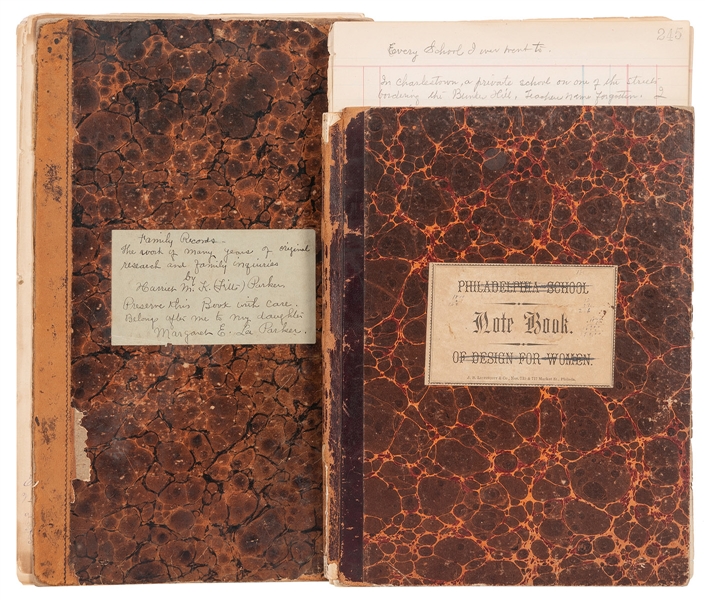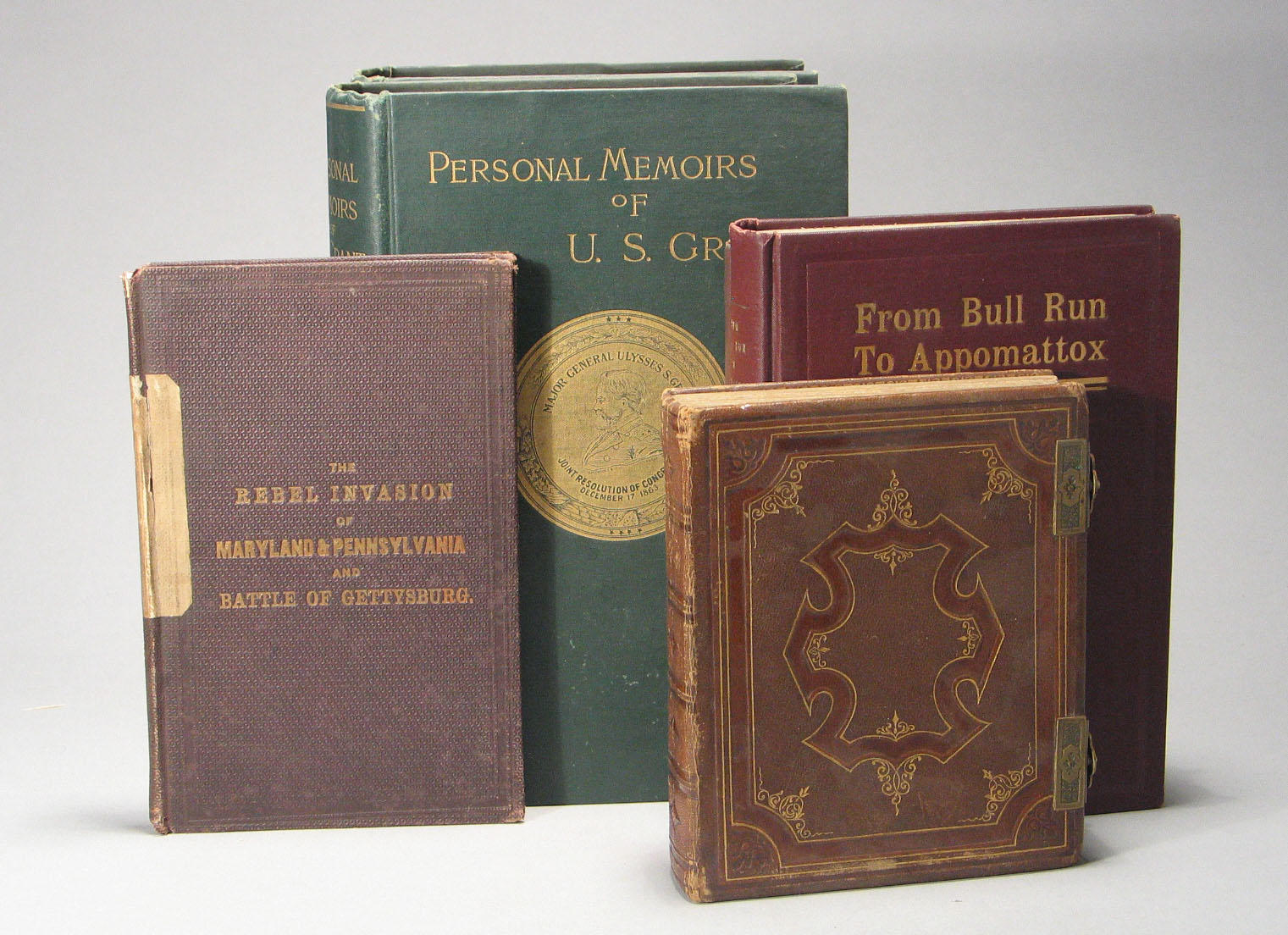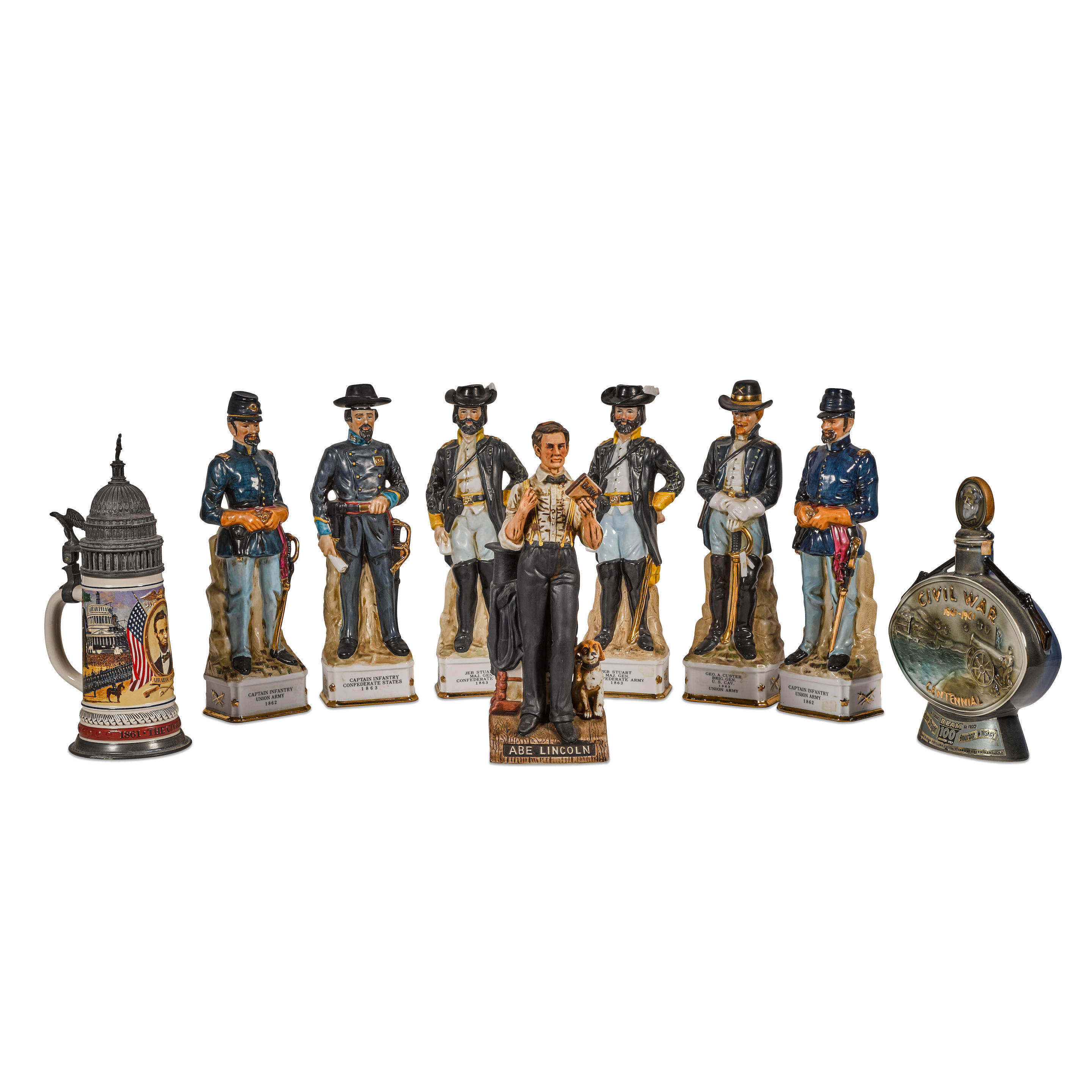Group of 17 Civil War, many Confederate, and Abraham Lincoln-related items, including: (A) a protest against fees imposed on a Captain John M. Smith in 1865 Philadelphia; the government imposed a tax on merchant seamen's pay to defray the cost of hospitalization for seamen in any port; the Marine Hospital Service was the forerunner of the Public Health Service, and the tax the first pre-paid medical care plan in the US, institutied July 18, 1798; (B) signed paper from Rear Admiral of the United States Navy, John D. Ford; Ford (1840-1918) served in the Civil War and Spanish American War; (C) rent receipt from Richard G. Lincoln; Mr. Lincoln (1844-1930) was about a 3rd cousin of the President's, and reportedly resembled the Lincoln men; he purchased the Lincoln homestead in Berks Co., PA, although he rented this house in Reading because he was a freight clerk for the Phila. & Reading RR; (D) clipped signature of Richard Arnold, Brigadier General, Chief of Artillery, and West Point graduate; Arnold (1828-1882) graduate from USMA in 1850 and was posted to Florida before going to California and the Pacific Northwest; at the outbreak of war, he was commissioned Brig. Gen. of Vols., serving mostly in artillery positions; he returned to his rank in the regular army after the war serving with the 5th US Artillery; (E) ALS from Attorney General John E. Roller to Hon. A.R. Blakey, Charlottesville, Va.; concerning some claims being sent by a courier; John Roller (1844-1918) was a native of Rockingham Co., VA; and even though too young for Civil War service, he served with Co. I, 1st Va. Cav. anyway. He then entered VMI, graduating in July 1863 and was appointed to the 2nd CSA Engrs. in the autumn, serving with the ANV and surrendering at Appomattox CH; (F-G) an engraved card from General David Hunter and wife giving times they would be at home to receive callers; Hunter (1802-1886), president of the military commission that tried the Lincoln conspirators; and a clipped signature of John Bingham, presiding assistant judge for the trial of Lincoln's assassins and prosecutor in the impeachment trial of Andrew Johnson; (H-I) two transcriptions of Military Telegraphs, one on a USMT form, one handwritten; the first is dated Dec. 8, 1862, from L.H. Bayly to Brg. Genl Nagler re: permitting passage; the other from Major General John A. Dix, "Received 24th 1862, Fort Monroe, Va." to Maj. Gen Keyes, re: rations and ammunition supplies; (J) portrait of Lincoln after photograph taken by Brady in 1862; (K) a printed letter with a facsimile signature from C.H. Crane, signed by a Elias Harding for an artificial limb in July 8, 1880; letter informs him that he can only apply for a limb once in 10 years and his last application was Aug. 5, 1870, so he can't apply until Aug. 5, 1880. It further informs him that he cannot apply ahead of time (so he needed to wait a month to fill out the form). (L) an 1880 LS from U.S. Secretary of the Interior, signed by Carl Schurz; secretarial ms letter, on Department of the Interior letterhead, 10 Feb. 1880; to unknown recipient, but clearly someone of importance, since this is a cover that accompanied papers pertaining to a case of the Northern Pacific Railroad Company v. the United States; at the end he notes: "He wishes the papers to be returned to his office when no longer needed." One doubts papers on a court case would be sent to just anyone... Possibly lent to the President (Hayes), himself... Carl Christian Schurz (1829-1906) was yet another German revolutionary "Forty-Eighter" forced to flee and "inherited" by the United States, a group that "latched on" to many social issues here. Schurz, for example, became immersed in anti-slavery activities, yet after the Civil War and emancipation, did not want the government to defend former slaves, retaining ideas of European superiority, or use the military to destroy the KKK. He continued the earlier policies of resettling native Americans on reservations, and ignoring t
Group of 17 Civil War, many Confederate, and Abraham Lincoln-related items, including: (A) a protest against fees imposed on a Captain John M. Smith in 1865 Philadelphia; the government imposed a tax on merchant seamen's pay to defray the cost of hospitalization for seamen in any port; the Marine Hospital Service was the forerunner of the Public Health Service, and the tax the first pre-paid medical care plan in the US, institutied July 18, 1798; (B) signed paper from Rear Admiral of the United States Navy, John D. Ford; Ford (1840-1918) served in the Civil War and Spanish American War; (C) rent receipt from Richard G. Lincoln; Mr. Lincoln (1844-1930) was about a 3rd cousin of the President's, and reportedly resembled the Lincoln men; he purchased the Lincoln homestead in Berks Co., PA, although he rented this house in Reading because he was a freight clerk for the Phila. & Reading RR; (D) clipped signature of Richard Arnold, Brigadier General, Chief of Artillery, and West Point graduate; Arnold (1828-1882) graduate from USMA in 1850 and was posted to Florida before going to California and the Pacific Northwest; at the outbreak of war, he was commissioned Brig. Gen. of Vols., serving mostly in artillery positions; he returned to his rank in the regular army after the war serving with the 5th US Artillery; (E) ALS from Attorney General John E. Roller to Hon. A.R. Blakey, Charlottesville, Va.; concerning some claims being sent by a courier; John Roller (1844-1918) was a native of Rockingham Co., VA; and even though too young for Civil War service, he served with Co. I, 1st Va. Cav. anyway. He then entered VMI, graduating in July 1863 and was appointed to the 2nd CSA Engrs. in the autumn, serving with the ANV and surrendering at Appomattox CH; (F-G) an engraved card from General David Hunter and wife giving times they would be at home to receive callers; Hunter (1802-1886), president of the military commission that tried the Lincoln conspirators; and a clipped signature of John Bingham, presiding assistant judge for the trial of Lincoln's assassins and prosecutor in the impeachment trial of Andrew Johnson; (H-I) two transcriptions of Military Telegraphs, one on a USMT form, one handwritten; the first is dated Dec. 8, 1862, from L.H. Bayly to Brg. Genl Nagler re: permitting passage; the other from Major General John A. Dix, "Received 24th 1862, Fort Monroe, Va." to Maj. Gen Keyes, re: rations and ammunition supplies; (J) portrait of Lincoln after photograph taken by Brady in 1862; (K) a printed letter with a facsimile signature from C.H. Crane, signed by a Elias Harding for an artificial limb in July 8, 1880; letter informs him that he can only apply for a limb once in 10 years and his last application was Aug. 5, 1870, so he can't apply until Aug. 5, 1880. It further informs him that he cannot apply ahead of time (so he needed to wait a month to fill out the form). (L) an 1880 LS from U.S. Secretary of the Interior, signed by Carl Schurz; secretarial ms letter, on Department of the Interior letterhead, 10 Feb. 1880; to unknown recipient, but clearly someone of importance, since this is a cover that accompanied papers pertaining to a case of the Northern Pacific Railroad Company v. the United States; at the end he notes: "He wishes the papers to be returned to his office when no longer needed." One doubts papers on a court case would be sent to just anyone... Possibly lent to the President (Hayes), himself... Carl Christian Schurz (1829-1906) was yet another German revolutionary "Forty-Eighter" forced to flee and "inherited" by the United States, a group that "latched on" to many social issues here. Schurz, for example, became immersed in anti-slavery activities, yet after the Civil War and emancipation, did not want the government to defend former slaves, retaining ideas of European superiority, or use the military to destroy the KKK. He continued the earlier policies of resettling native Americans on reservations, and ignoring t














Testen Sie LotSearch und seine Premium-Features 7 Tage - ohne Kosten!
Lassen Sie sich automatisch über neue Objekte in kommenden Auktionen benachrichtigen.
Suchauftrag anlegen